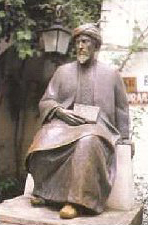
" Ya banni Israil fadalnakom ‘aan el ‘aalamin »
Children of Israel! call to mind the (special) favour which I bestowed upon you, and that I preferred you to all others "
(The Koran 2. 47)

Please refer to links for various sites on the history of Jews from Egypt. In this section you will find articles by Alec Nacamuli and Yves Fedida of the Nebi Daniel council, J-F. Fau, Frédéric Abecassis as well as Rachelin Barda, which enable us to better understand the indigenous and exogenous origins of our Community and its fate.
Alec recalls the tumultuous history from the Arab conquest to the Second Exodus, underlining the Jewish contribution to Egyptian cultural, political and economic life and describing the lifestyle across layers of society.
In his study of the Montefiore census of the Jews from Alexandria, Yves gives us an insight into the human fresco of this Mediterranean society around 1840, its unique characteristics and its evolution.
The Jewish population increased by 135% during the 30 years after 1897, compared with the total Egyptian population which only grew by 32%. The overwhelming majority of the Jewish community is therefore less than 100 years old.
| Year | Jewish Population |
| 1807 | 6000 |
| 1847 | 8500 |
| 1897 | 25200 |
| 1907 | 38635 |
| 1917 | 59184 |
| 1927 | 63550 |
| 1947 | 90000 |
| 1957 | 15000 |
| 1977 | 200 |
| 2005 | +/- 40 |
There was never a “right to nationality by country of birth” in Egypt for the Jews. In 1897, 50% were foreign nationals. We find the same percentage as in 1927 after Egypt became an independent state.
People were either “local subjects” or “natives”, or protected by one of the capitular states. Religion was assimilated to nationality for the civil status. Egypt did not have a clear law defining Egyptian nationality for non-Muslims.
The laws of 1926 and 1929 stipulated that those born in the Ottoman Empire before World War 1 and holders of a Turkish/ottoman birth certificate could claim Egyptian nationality. This enabled Iraqi and Syrian/Lebanese Jews to easily become Egyptian nationals.
However, Jews whose parents or who themselves were born in Egypt had to prove that they had not held any foreign nationality since 1848, which was impossible for many. A large number therefore became “stateless”. Nationality became a “racial” issue as intended by article 10, paragraph IV of the law. Are considered Egyptians: “children born in Egypt of a foreign father himself born in Egypt, if this foreigner is attached by race to the majority of the population of an Arabic-speaking or Muslim country”. This had severe consequences and explains the successive waves of emigration, particularly after the introduction of legislation imposing quotas and preferences for Egyptian nationals.
Jean- François & Frédéric, recall the old-established Karaite presence in Egypt, particularly in Cairo. This community contributed significantly to the modernisation of Egypt, subsequently amplified by the successive immigration waves of rabbanite Jews.
Those immigration waves and the subsequent emigration are documented in great detail by Racheline Barda.
“The elders of the Alexandria Community”. Please let us know if you recognise any faces.
We welcome your contributions to this page, please send to editor@nebidaniel.org